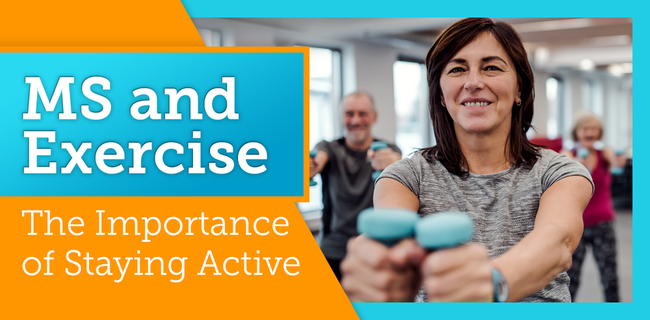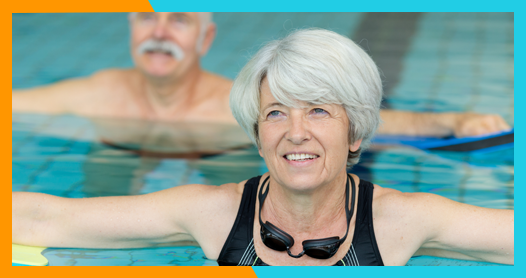
Quick Links
Resources
About MyMSTeam
Powered By






Staying active when you have multiple sclerosis (MS) is one of the best tools you have to support your overall mental and physical wellness. While exercising with MS has its challenges, finding the routine that works for your health needs can help you feel your best.
Benefits of Exercise for MS |
Doctors used to advise against exercise for people with multiple sclerosis. The old belief was that physical activity could worsen symptoms or cause MS to progress. Today we understand that exercise can have tremendous wellness benefits for people with MS, though there is no evidence that exercise can slow the progression of MS. These benefits include:
Some of the possible mental and emotional benefits of exercise include:
A sedentary lifestyle carries its own risks. Lack of exercise can increase your risk for developing related health conditions like high blood pressure or high cholesterol, cause constipation, damage joint function, and lead to muscle weakness from disuse.
Exercise Precautions |
Every person with MS is different. The right exercise routine to support your physical and emotional wellness will depend on your specific MS symptoms, your mobility, your type of MS, and your treatment plan. Your doctor is your best resource for determining which exercises will be safe and beneficial for your well-being. Always consult your health care provider before beginning a new exercise routine.
Best Types of Exercise for MS |
 While everyone with MS has different needs, focusing on cardiovascular fitness, muscle strength, balance, and flexibility is a good place to start. Below are a few types of exercise that are commonly recommended for people with MS.
While everyone with MS has different needs, focusing on cardiovascular fitness, muscle strength, balance, and flexibility is a good place to start. Below are a few types of exercise that are commonly recommended for people with MS.
Water exercise can be a good option for people with MS. Swimming, water aerobics, and other aquatic exercise programs are good forms of aerobic activity that can also build muscle strength. Exercising in water can help mitigate certain factors that make exercising on land challenging for people with MS. For example, the buoyancy of the water can help manage fatigue by reducing resistance and cool water can help avoid overheating. Water activity can also help people overcome mobility constraints. With the right support and safety precautions, people who normally can’t use their legs may be able to use their lower limbs in the water, which can have positive physical and psychological effects. There is also a small amount of evidence that water exercise may support cognitive function. The Multiple Sclerosis Society of America provides free resources for beginning a water fitness routine for MS.
 Yoga can help people with MS improve or maintain the balance and strength needed for everyday activities like standing up and sitting down. The MS Society offers resources to help you find yoga videos and classes suitable for MS. If you’d like to practice yoga at a studio, avoid heated or Bikram yoga. You can also call ahead to confirm that your class will not be heated.
Yoga can help people with MS improve or maintain the balance and strength needed for everyday activities like standing up and sitting down. The MS Society offers resources to help you find yoga videos and classes suitable for MS. If you’d like to practice yoga at a studio, avoid heated or Bikram yoga. You can also call ahead to confirm that your class will not be heated.
Pilates may help people with MS improve balance and mobility and manage pain. A study of 71 people with MS who did not use wheelchairs found that Pilates helped improve walking speed and distance. The British National Health Service offers a seated Pilates video appropriate for people with MS.
 Tai chi is a gentle Chinese martial art involving slow, deliberate movements. In the general population, tai chi has been found to improve muscle strength and balance and lower blood pressure. In studies of people with MS, tai chi has been found to improve balance and overall quality of life.
Tai chi is a gentle Chinese martial art involving slow, deliberate movements. In the general population, tai chi has been found to improve muscle strength and balance and lower blood pressure. In studies of people with MS, tai chi has been found to improve balance and overall quality of life.
Stretching is a great way to manage spasticity, improve flexibility, and support range of motion in your neck, shoulders, arms, legs, hips, and other joints. The MS Society offers a guide for MS stretches that can help you get started with a stretching exercise routine.
More than 13,000 MyMSTeam members indicate that they have gone to a physical therapist. Physical therapy can help people with MS find appropriate exercises and set achievable goals for an exercise program. If you are interested in seeing a physical therapist, ask your doctor for a referral.
Overcoming Barriers to Exercise |
Finding the right exercise program for MS is often a process of trial and error. “We sometimes have to try multiple ways until we find the right one for us,” one MyMSTeam member reassured another struggling with exercise and fatigue.



Sign up for free!
Become a member to get even more




A MyMSTeam Member
Took some Physical therapy and even though in power chair she gave me simple ones to do that help esp with bladder / bowel controls. Also said one thing to me try lift legs even if don't do anything… read more